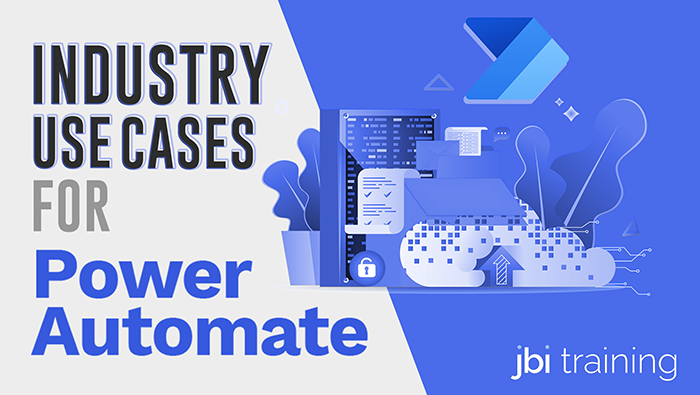Power Automate - How Do Industries Automate Their Workflows?
Power Automate is Microsoft's workflow automation platform that allows users to connect apps, data, and AI to build automated workflows. With over 300 out-of-box connectors to common apps like Office 365, SharePoint, Dynamics 365, Salesforce, and more, Power Automate makes it easy to streamline repetitive business processes, this is why Power Automate training has become so popular. The no-code interface enables anyone to build flows and scale workflows across an organisation.
Power Automate delivers immense value to companies in every industry by saving time, increasing productivity, and reducing costs. Here are some of the top use cases and examples of Power Automate workflows for major industries.
Finance & Accounting
In finance and accounting, Power Automate improves efficiency in key processes like invoice processing, budget tracking, financial reporting, and more. Example use cases include:
- Automating accounts payable - Invoice receipt from email is logged into accounting software and routed for approvals.
- Cash flow monitoring - Bank transaction data is imported into Excel where pivot tables track cash balances over time.
- Financial period close checklist - Tasks are tracked and notifications sent for closing tasks to be completed each period.
- Expense report automation - Expenses from company cards are categorised and input into expense modules.
Healthcare
Healthcare organisations utilise Power Automate to modernise processes around patient intake, order fulfilment, billing, compliance, and more. Common use cases are:
- Patient onboarding - Patient registration data triggers further workflows for insurance verification, ID checks, and scheduling.
- Prescription management - New e-prescriptions are logged in the patient health record and pharmacy system.
- Lab test results workflow - Test outcomes are analysed and routed to the ordering physician for review.
- Patient care coordination - Tasks are assigned and tracked for health team members involved in a patient's care.
Higher Education
Colleges and universities use Power Automate to improve enrolment, registration, communications, and other processes. Example workflows include:
- Student recruiting - Form submissions trigger personalised follow-up from admissions team members.
- Applicant status updates - Automated acceptance/rejection emails sent based on application criteria.
- Course registrations - Class rosters automatically compiled and sent to professors.
- Tuition reminders - Emails and texts sent when tuition payments are coming due.
Retail & Ecommerce
Retailers use Power Automate to enhance customer experiences, order fulfilment, inventory and logistics. Use cases include:
- Customer service escalation - Unresolved support tickets get elevated to management based on severity.
- Abandoned cart recovery - Emails are triggered to shoppers who left items in their carts.
- Inventory updates - Store inventory levels are maintained in real-time based on online and in-store sales data.
- New order processing - Orders route through fraud checks, payment processing, pick/pack workflows.
Manufacturing
Manufacturers employ solutions like Power Automate to optimise production processes, equipment maintenance, inventory, quality control, and more. Examples:
- Production monitoring - Telemetry from equipment syncs to dashboards tracking KPIs like cycle times, yield, downtime, etc.
- Predictive maintenance - Equipment sensors trigger alerts for parts needing replacement or repair.
- Inventory replenishment - Low stock levels automatically create purchase orders to suppliers.
- Quality incident management - Test results outside of spec route to quality engineers for investigation.
Professional Services
Law firms, consultancies, architecture studios and other professional services leverage Power Automate to streamline client onboarding, resource management, and service delivery. Use cases include:
- Client intake - Contact form data triggers standardised processes for new client setup and contracts.
- Resource allocation - Project timelines and assignments automatically factor into staff schedules and utilisation reports.
- Billing automation - Time logs trigger invoicing based on contract rates and retainer balances.
- Work product review/approval - Documents route through multi-level approval workflows before client delivery.
IT & Technology
IT teams use Power Automate for processes like incident management, change control, app deployments, and more. Examples include:
- Incident workflow - Issues from service desk tool automatically trigger triage, assignment, escalation based on priority.
- Application onboarding - Requests route through security reviews, provisioning steps to deploy new apps.
- Employee offboarding - Access removal tasks trigger when employees leave the company.
- Patch management - Systems needing security patches are identified and remediation scheduled.
Human Resources
HR leverages automation for recruiting, onboarding, training, performance management, and offboarding workflows. Use cases are:
- New hire onboarding - Welcome kits, equipment, access provisioning happens automatically.
- Training compliance - Employees are auto-enrolled in required learning when eligibility criteria met.
- Performance reviews - Review forms route through manager, employee, HR based on schedule.
- Offboarding - Exit processes initiate for collecting equipment, access removal, documentation.
Sales & Marketing
Sales and marketing teams automate lead management, account-based engagement, campaign execution, and other programmes. Examples include:
- Lead nurturing - Email drips tailored to lead source, interests, and behaviours.
- Event management - Registrations trigger confirmations, reminders, follow-ups.
- Campaign tracking - Response data syncs automatically to CRM and analytics systems.
- Content personalisation - Documents merge with customer data for personalised delivery.
Across industries, common use cases for Power Automate centre on business process automation, application integration, lifecycle management, task coordination, data collection and analysis, notifications and alerts, and productivity optimisation. The connectors, triggers, actions, and AI capabilities make it possible to digitise even complex workflows. Business users can build solutions with minimal IT support to save time, reduce errors, improve visibility, and scale operations.
These are just some of the many examples of how leading organisations are leveraging Power Automate today. The platform makes it fast and simple to automate mundane work, so employees can focus on high-value activities. Power Automate solutions deliver rapid time to value, and can have significant business impact within weeks or months of adoption. With the low-code no-code interface, any company can start their automation journey and continuously improve processes over time.
By connecting apps, automating processes, and applying AI, Power Automate enables businesses to optimise operations, engage customers, empower employees, and transform products. It is a versatile automation platform that can benefit every function and industry.
Major Capabilities and Use Cases
Here is a deeper look at some of the major capabilities within Power Automate and associated business use cases:
Cloud Flows
Cloud flows provide a canvas to visually build workflows that connect to cloud services and on-premises data. Use cases include:
- Business process automation - Streamline approvals, notifications, content routing across teams.
- App integration - Sync data between cloud apps like Office 365, Salesforce, SharePoint.
- Task coordination - Automate multi-step processes involving people, apps, and data.
- Lifecycle management - Trigger processes on events like new customer sign-up.
- Productivity - Automate repetitive tasks for efficiency and consistency.
Desktop Flows
Desktop flows automate interactions with desktop apps like Outlook and Windows. Scenarios include:
- Email productivity - Automate Outlook tasks like meeting invites, mail merge, data collection.
- Data transfer - Copy data between Excel, SQL Server, SharePoint, other sources.
- Text and image processing - Manipulate text and images within flows.
- Desktop automation - Automate desktop interactions, scrapers, bots.
- Testing automation - Automate UI testing of desktop applications.
Instant Flows
Instant flows use pre-built templates for quick automations around common scenarios like:
- Approvals - Route documents, requests, or orders through an approval chain.
- Lead capture - Collect form or survey data into SharePoint, Excel, or Dynamics.
- Sheets workflow - Automate processes using Google Sheets data and forms.
- Alerts and notifications - Get notified for new data, events, metrics thresholds, etc.
- Twitter analytics - Run analysis on hashtags, accounts, trends.
Business Process Flows
With business process flows, you can build structured multi-step processes for scenarios like:
- Sales deal progression - Move deals through defined stages from prospect to close.
- Help desk ticket handling - Triage, assign, investigate, and resolve support tickets.
- New employee onboarding - Checklist of tasks to onboard and engage new hires.
- Customer service processes - Standard steps for common customer service cases.
- Purchase order handling - Steps for processing orders through fulfilment.
Enterprise-grade Capabilities
Power Automate provides enterprise-level tools for:
- Central administration - Manage environments, licensing, policies, analytics.
- Monitoring and debugging - Monitor flow usage metrics. Troubleshoot and fix failures.
- Business continuity - Back up and restore flows. Ensure continuity.
- Compliance and security - Apply data loss prevention policies. Encrypt sensitive data.
- Connectors - Use 1000+ connectors for apps, cloud services, on-prem systems.
These capabilities allow large organisations to securely scale automation across the enterprise. Analytics provide insights into automation programmes and ROI.
Your next read is this interesting article, "I wish that I knew what I know now When I was younger".

